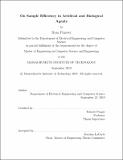On sample eciency in artifical and biological agents
Author(s)
Prinster, Ryan(Ryan T.)
Download1220875111-MIT.pdf (10.69Mb)
Other Contributors
Massachusetts Institute of Technology. Department of Electrical Engineering and Computer Science.
Advisor
Tomaso Poggio.
Terms of use
Metadata
Show full item recordAbstract
Many of the predominant learning paradigms in modern machine learning techniques are inspired by biology. Deep networks are inspired by the neurons in the brain, and reinforcement learning was originally inspired by operant conditioning in cognitive science. However, there are still signicant gaps between artifical and biological models of intelligence. One notable difference is sample eciency - animals, in particular humans, are able to understand concepts and solve tasks with only a few demonstrations, whereas artifical agents take millions of examples and make just as many mistakes. This paper aims to quantify the raw difference in sample efficiency, accounting for the signicant priors held by biological agents. We do this by designing a suite of tasks that must be solved by both agents, in which each task requires a significantly dierent aspect of general intelligence to be solved. We train artifical and biological agents on said tasks after initial learning stages to control for significant priors, and finally examine and compare the quality and efficiency of learning in these tasks, such that we might understand the relationship between the sample eciency of biological and artifical agents in general learning environments.
Description
This electronic version was submitted by the student author. The certified thesis is available in the Institute Archives and Special Collections. Thesis: M. Eng., Massachusetts Institute of Technology, Department of Electrical Engineering and Computer Science, September, 2019 Cataloged from student-submitted PDF of thesis. Includes bibliographical references (pages 67-69).
Date issued
2019Department
Massachusetts Institute of Technology. Department of Electrical Engineering and Computer SciencePublisher
Massachusetts Institute of Technology
Keywords
Electrical Engineering and Computer Science.